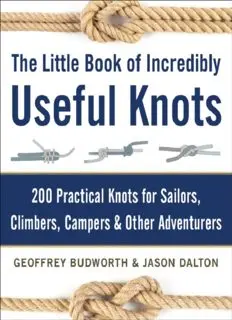
The little book of incredibly useful knots: 200 practical knots for sailors, climbers, campers & other adventurers PDF
Preview The little book of incredibly useful knots: 200 practical knots for sailors, climbers, campers & other adventurers
Copyright © 2002 The Ivy Press Limited First Skyhorse Publishing edition 2016 The moral right of the authors has been asserted. All rights to any and all materials in copyright owned by the publisher are strictly reserved by the publisher. All rights reserved. No part of this book may be reproduced in any manner without the express written consent of the publisher, except in the case of brief excerpts in critical reviews or articles. All inquiries should be addressed to Skyhorse Publishing, 307 West 36th Street, 11th Floor, New York, NY 10018. Skyhorse Publishing books may be purchased in bulk at special discounts for sales promotion, corporate gifts, fund-raising, or educational purposes. Special editions can also be created to specifications. For details, contact the Special Sales Department, Skyhorse Publishing, 307 West 36th Street, 11th Floor, New York, NY 10018 or [email protected]. Skyhorse® and Skyhorse Publishing® are registered trademarks of Skyhorse Publishing, Inc.®, a Delaware corporation. Library of Congress Cataloging-in-Publication Data is available on file. Visit our website at www.skyhorsepublishing.com. Cover design by Tom Lau Cover image credit John Fowler Print ISBN: 978-1-5107-0656-9 Ebook ISBN: 978-1-51070657-6 This book was conceived, designed, and produced by Ivy Press 210 High Street, Lewes, East Sussex BN7 2NS, UK www.ivypress.co.uk Creative Director PETER BRIDGEWATER Publisher SOPHIE COLLINS Editorial Director STEVE LUCK Design Manager TONY SEDDON Designer JANE LANAWAY Illustrator JOHN FOWLER Project Editor MANDY GREENFIELD Printed in China 10 9 8 7 6 5 4 3 2 1 PUBLISHER’S NOTE This book is a general introduction to the usefulness and pleasure of knotting. Before using any one of these knots, bends, hitches, etc. in a potentially hazardous situation—whether at work or at leisure—with foreseeable risks of injury, damage, or loss, you are strongly advised to seek the advice and tuition of suitably qualified practitioners to learn how to tie and deploy them in such a situation. KNOT RATINGS All the knots in this book are evaluated under four headings: STRENGTH SECURITY EASE OF TYING EASE OF UNTYING 1 represents the lowest score, while 5 represents the optimum. Contents Introduction Bends Loops Hitches Lashings and coils Stoppers, whippings, and splices Glossary Index of knots Further information Introduction “Knots are more numerous than the stars; and equally mysterious and beautiful.” DR. JOHN TURNER, 1988 Learn just one helpful knot, use it often, and the cost of this book will be amply repaid. Acquire several knots, and life will never be the same. For, just as being able to cook, garden, swim, read a map, or administer first aid enhances self-reliance and impresses friends, so “knowing the ropes” (being knotwise) is the key to fresh experiences. Cave dwellers tied the first few knots; a piece of knotted fishing net, found in peat bog in what is today Finland, has been dated to 7,200 . BC Now there are thousands of bends, hitches, lashings, and loops, more than 200 of which are included here. Some have names that still evoke how and by whom they were once tied: the wagoner’s hitch, highwayman’s hitch, surgeon’s knot, farmer’s halter hitch, and hangman’s noose. Bellringers, shopkeepers, linesmen and lumberjacks, trappers and tree surgeons all used a knot or two peculiar to their trades or callings. Now, whether you engage in demanding outdoor pursuits or need to secure a load to your roof rack, want to tie a bandage or go fishing, there is a knot that will do the job—and this book shows you how. But, as Charles L. Spencer noted in his Knots, Splices and Fancywork, “I have found many instances of different names for the same knot . . . and I have had to compromise in some cases.” In this book, knots are grouped loosely according to construction and tying method, and not always according to use. Up-to-date knotting flourishes on the Internet, where numerous web masters represent every kind of knot application, from the basic to the bizarre. In 1990 the New Zealand professor Vaughan Jones was even awarded a Field’s Medal (the mathematician’s equivalent of a Nobel Prize) for original work in theoretical knotting. Read on and learn more about the fundamental—yet fascinating—art, craft, and science of knots. GEOFFREY BUDWORTH Bends A bend is the generic term used to describe a knot that joins together two lengths of rope. It should be capable of being untied relatively easily, except when it is tied in fine line. The bends in this section range from the general-purpose (such as the sheet bend) to specialized anglers’ knots (such as the mono braid bend and the nail knot).
